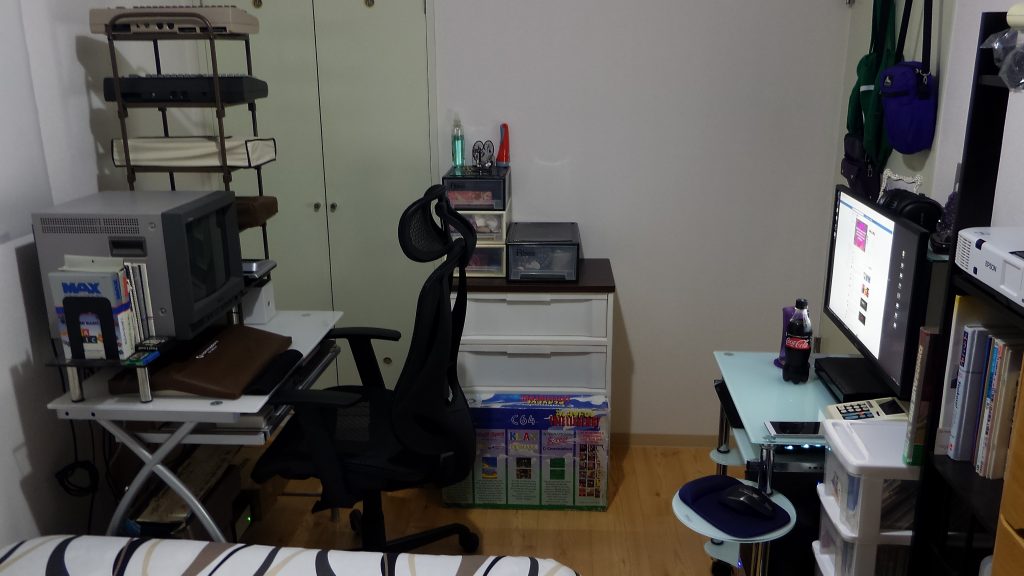I mentioned that my room is very small compared to the places I’d lived in the US. As you can see from the picture, I have two desks, one for retro stuff and one for my main PC. To switch from one to the other, I turn the chair around and roll forward about one and a half steps. Kinda convenient but everything is so tight! And my bed basically brushes up against the chair most of the time.
Besides the desks and computers, there’s also a small set of drawers next to my main PC, which holds stuff that I plan to auction, and a rack next to that which holds my projector and my Plus/4 box. Behind the Commodore desk, you can’t see, but there’s a narrow book rack that I use to hold my joysticks and cartridges. And the rack on the Commodore desk is so cheap and flimsy, and tangled up in the monitor stand, that it’s a real hassle to switch out computers and use one of the others.
In other words, just no space!
But that’s all about to change! I am moving. Still within Japan, and actually still within the same city, but my wife and I have decided to buy a house. It has about 40% more space than my current apartment, and I will have about half of one room dedicated to the computer collection! I’ll probably end up getting one or two additional computers, but mostly I am going to take the opportunity to spread out a bit and enjoy some space!


Hi there, nice idea stacking the computers like that. Is that a Sony PVM monitor?
Thanks, although now my arrangement is quite different. And yeah, it’s a Sony PVM, but I recently replaced it with a different Sony PVM. The new one has a cable for connecting my Commodore 128 in 80-column mode, so I can use both modes with one monitor.
Hi,
I am writing my Bachelor thesis on japanese game conversions.
As a fan of C64 I stumbled uppon your page.
I am searching for a game that uses kanji as “graphical elemets” for the game, like games that use witable characters to create images of stuff.
Do you know about any by any chance ?
I also would like to quote you and your page in my thesis, but the rules we have need full name of the author in order to use it. So if you dont mind can you please disclose that information to me ?
Anyways, excelent page man !
Thanks for the comment! Your thesis sounds like an interesting one.
Regarding your questions: first, my full name is Sean Noble. I’m curious which information you would like to quote. Maybe I can expand or add context.
Second, would a game like Shanghai/Mahjong count? I have a game for a computer system I’m almost finished writing an entry about, for which I have a game that has a handful of characters used on the tiles. I am also currently exploring a game that is based on old Chinese literature or history (haven’t worked out which yet) that uses kanji on artistically-drawn signs for names of locations, and probably in other ways, too. I can and will be posting screenshots in the next day or so.
If you mean something a little different, can you give me an example?
Hello Sean
hope to find you well!
this is Edoardo, living in Tokyo Shinagawa-ku, and I am a Commodore/Amiga collector. Together with other 3 guys here, we own and use Amiga machines and would be great to keep in touch with you as well.
You would privately contact me by email and later exchange mobile phone no., LINE, WHATSAPP, etc. Thanks & Regards
Edoardo
Thanks for the comment! Really looking forward to next Saturday.
Thank you for the interesting blog.
I live in Osaka. Recently I bought a Japanese Version of the Commodore 64 on Yahoo Auctions, unfortunately the User’s guide is missing. I have been trying to buy or download a Commodore 64 user’s guide in Japanese, but haven’t found one yet. Do you know where I could download it as a PDF? Of course the C64 eng/jpn Version’s ROMs are not that different except Katakana, so I know how to use it. But it would be fun and it would be a good Japanese reading practice for me to read it again in Japanese language. Would you like to share your Japanese C64 user’s guide with us?
Thanks for the comment! Congratulations on your purchase. It was very unexpected that two of those Japanese Commodore 64s appeared at the same time. One sold for 130,000 yen, and the (only) bidder was my friend. Actually, I just checked and I couldn’t find the other auction in completed listings. But I assume you must have bought that one?
I was just talking with someone on a vintage computing Facebook group about this topic the other day. It seems some people have a mindset of not wanting to reproduce their rare manuals because of the perception that it loses value. I am definitely not one of those people and have begun the process of scanning some manuals I’ve never seen online before.
Unfortunately, though… I can’t reproduce this one. The condition is nearly mint. The process of making decent-looking scans would put creases in the binding. I picked up a Japanese C64 for another friend in Germany about a year ago, and his manual wasn’t in as good condition so I asked him about allowing me to scan it, but he asked me not to do that, I presume for the same reason. And unfortunately, I don’t know of a source for a scanned version of the manual. I hope to come across another copy of the manual some day.